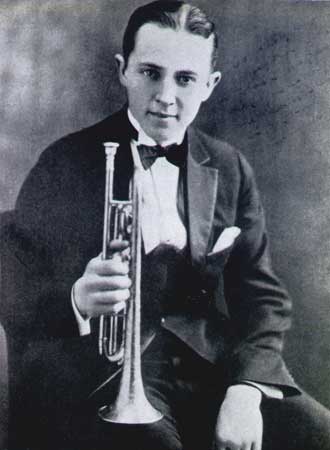Bix Beiderbecke, one of the greatest jazz musicians of 1920’s, was also a Jazz Age child who consumed Prohibition liquor until he died. Bix Beiderbecke’s hard drinking and stunning tone on the cornet made his life a legend. After his death, the legend of Bix grew larger. Bix did not learn to read music well but had an incredible ear for music even as a child. In 1921, his parents disapproved of him playing music and sent Bix to a military school in Chicago. Soon he was expelled from class for failing to attend and he became a full-time musician. Beiderbecke joined Wolverine Orchestra in 1923 and recorded the next year with them. Bix was greatly influenced by the Original Dixieland Jass Band but quickly surpassed their playing. Bix joined Jean Goldkette’s Orchestra in late 1924, but his inability read music ultimately led to him losing the job. He recorded “In a Mist”, his solo piano composition, while he was with Frankie Trumbauer’s Orchestra in 1926. Under the names Tram, Bix and Eddie, he also recorded some of his finest work with Trumbauer’s Orchestra and guitarist, Eddie Lang. Bix was able enough to improve his sight-reading skills to rejoin Jean Goldkette’s Orchestra briefly before signing up to be a soloist in Paul Whiteman’s Orchestra. Whiteman’s Orchestra was the most famous band of 1920’s. Bix enjoyed the fame and fortune of playing with such a successful group, but that didn’t stop him from drinking. Bix began to drink more in 1929. Bix suffered from delirium and had a nervous breakdown while playing in the Paul Whiteman Orchestra. He was finally sent back home to Davenport, Iowa, to heal. It is important to note that Paul Whiteman was very kind to Bix throughout his struggle. Bix received full pay even after his breakdown and Whiteman promised that his seat in the Whiteman Orchestra would always be open. However, Bix never recovered and never joined the band again. In 1930, he returned to New York and recorded a few more records under the name Bix Beiderbecke u0026 his Orchestra. He stayed in Queens, New York, in a small rooming house, where he drank heavily and worked on his solo piano pieces, “Candlelight”, Flashes, and “In The Dark”. (Played here by Ralph Sutton; Bix never made them). He died at age 28 in 1931 during an alcoholic seizure. Official cause of death was lobar pneumonia and edema in the brain. from http://redhotjazz.com
